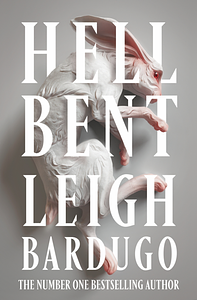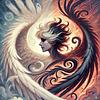Take a photo of a barcode or cover
adventurous
challenging
dark
hopeful
mysterious
tense
medium-paced
Plot or Character Driven:
A mix
Strong character development:
Yes
Loveable characters:
Yes
Diverse cast of characters:
Complicated
Flaws of characters a main focus:
Yes
medium-paced
Plot or Character Driven:
Plot
Strong character development:
Yes
Loveable characters:
Yes
Diverse cast of characters:
Yes
Flaws of characters a main focus:
Yes
adventurous
challenging
dark
hopeful
mysterious
reflective
sad
medium-paced
Plot or Character Driven:
A mix
Strong character development:
Yes
Loveable characters:
Yes
Diverse cast of characters:
Yes
Flaws of characters a main focus:
Yes
Like »Ninth House«, the sequel is original like hell - emphasis on 'hell'. The atmosphere is deliciously dark, the story gripping and always on the edge of horror ... Or beyond. Hey, this is about characters literally going to hell to save Darlington.
I love Leigh Bardugo's flair for detail, which makes her world so much richer, more original, and more profound. Funnier, too, though the humor is blacker than my morning coffee. It provides the necessary balance between hard horror, social criticism and magical fantasy.
Alex Stern discovers that there are still things she didn't know about the magic of her world – like vampires. But Leigh Bardugo isn't encroaching on Twilight territory! Her vampires are a result of the magic system we learned about in the first volume.
Hell pushes our characters to the edge of what they can bear - how they deal with those experiences afterwards reads almost like a case study on trauma and post-traumatic stress. As in the first volume, the author anchors her magical world in reality, including its messy aspects.
Characters who weren't very important in the first volume play a central role in this one: Alex's roommate Mercy and the chilled, somewhat goofy Tripp. (I was surprised at how much Tripp grew on me!)
Whoever wants to open the gates of hell must fulfill certain criteria - for its four gates, four murderers must give their blood. Alex herself meets this condition, because she killed Len and his cronies. But the fact that she actually finds three comrades-in-arms who also fulfill this condition was quite a surprise, to say the least!
This is where the lines between good and evil become blurred. When do you have the right to take someone's life? The demons of hell don't really care.
Although I'm normally a very slow reader, I blew through the 576 pages of this book in one weekend.
I love Leigh Bardugo's flair for detail, which makes her world so much richer, more original, and more profound. Funnier, too, though the humor is blacker than my morning coffee. It provides the necessary balance between hard horror, social criticism and magical fantasy.
Alex Stern discovers that there are still things she didn't know about the magic of her world – like vampires. But Leigh Bardugo isn't encroaching on Twilight territory! Her vampires are a result of the magic system we learned about in the first volume.
Hell pushes our characters to the edge of what they can bear - how they deal with those experiences afterwards reads almost like a case study on trauma and post-traumatic stress. As in the first volume, the author anchors her magical world in reality, including its messy aspects.
Characters who weren't very important in the first volume play a central role in this one: Alex's roommate Mercy and the chilled, somewhat goofy Tripp. (I was surprised at how much Tripp grew on me!)
Whoever wants to open the gates of hell must fulfill certain criteria - for its four gates, four murderers must give their blood. Alex herself meets this condition, because she killed Len and his cronies. But the fact that she actually finds three comrades-in-arms who also fulfill this condition was quite a surprise, to say the least!
This is where the lines between good and evil become blurred. When do you have the right to take someone's life? The demons of hell don't really care.
Although I'm normally a very slow reader, I blew through the 576 pages of this book in one weekend.
adventurous
challenging
dark
emotional
mysterious
tense
medium-paced
Plot or Character Driven:
Plot
Strong character development:
Yes
Loveable characters:
Yes
Diverse cast of characters:
No
Flaws of characters a main focus:
Yes
تا حدی نسبت به جلد اول تفاوت داشت. بیشتر درگیر پلات بود و وقت کمی برای محفلها گذاشت. خودِ داستان خوب بود ولی میشد مقداری کوتاهتر باشه. در کل خوش گذشت و سکانسهای خوبی داشت. ترجمه شه، احتمالاً یه قسمت درخشان کتاب سانسور میشه
If you know, you know :))
اگه وسطش بیشتر از صد ساعت وقت پای کینگدام کام نمیذاشتم خوندنش یه ماه طول نمیکشید
If you know, you know :))
اگه وسطش بیشتر از صد ساعت وقت پای کینگدام کام نمیذاشتم خوندنش یه ماه طول نمیکشید
Love this series. At times I was befuddled but I'm all in on seeing what happens in the next book!
dark
mysterious
The dark academia vibes I absolutely loved in Ninth House kind of fizzled out and mutated into a full on demon-vampire-dark magic chaos that made this book much more dark epic fantasy than the first.
...Which isn't necessarily a bad thing; but I do wish we could have kept more of the dark academia feel.
This book is so complex with a lot of information thrown at you. It was a lot to take in.
The plot twists were twisting... but instead of giving me fun-ride whiplash, it was more like twisting my head all the way around and leaving me confused.
There were a lot of moments that I had to stop and say "👀...ok what??" and then read again to understand.
I may need to reread this whole book to catch the details missed this first time.
That said, I still absolutely love the characters.
I'm obsessed with Alex as our protagonist. Being inside her head is both a mindfuck and an absolute thrill and I am here for it.
Also, Dawes is giving Emily Wilde vibes and I love her.
While the type of magical realism I typically gravitate towards is a little more ✨Whimsy and wonder with occasional shadow areas to feed my black heart 🖤✨ ...
This is a little more ⛓️👹Demons and blood with stark reminders that the world is a dark, harsh place and the reality of magic is just as dark, unfair, and harsh🕯️⛓️
Even so, I did truly enjoy this story and will most likely be ready for a reread come fall because there has never been a more perfect spooky season fantasy read. 🍂
I went into this thinking it was a duology but apparently there is third and final book yet to come! Thank god because that ending would have been pretty weird 😆
I will most definitely be reading the next book when it comes out.
...Which isn't necessarily a bad thing; but I do wish we could have kept more of the dark academia feel.
This book is so complex with a lot of information thrown at you. It was a lot to take in.
The plot twists were twisting... but instead of giving me fun-ride whiplash, it was more like twisting my head all the way around and leaving me confused.
There were a lot of moments that I had to stop and say "👀...ok what??" and then read again to understand.
I may need to reread this whole book to catch the details missed this first time.
That said, I still absolutely love the characters.
I'm obsessed with Alex as our protagonist. Being inside her head is both a mindfuck and an absolute thrill and I am here for it.
Also, Dawes is giving Emily Wilde vibes and I love her.
While the type of magical realism I typically gravitate towards is a little more ✨Whimsy and wonder with occasional shadow areas to feed my black heart 🖤✨ ...
This is a little more ⛓️👹Demons and blood with stark reminders that the world is a dark, harsh place and the reality of magic is just as dark, unfair, and harsh🕯️⛓️
Even so, I did truly enjoy this story and will most likely be ready for a reread come fall because there has never been a more perfect spooky season fantasy read. 🍂
I went into this thinking it was a duology but apparently there is third and final book yet to come! Thank god because that ending would have been pretty weird 😆
I will most definitely be reading the next book when it comes out.
Before I get into the details of the review, I'll briefly share my opinion about this book: I didn't like it as much as the first book. In fact, if someone expects something like the first book, they might be disappointed. The story's setting has largely moved away from the societies and university and academia in general and has entered the fantasy world of the story. This isn't necessarily a bad thing, but one of the things that made 'The Ninth House' appealing was its connection to the university and the history of Yale.
With that said, the main conflict and plot revolve around how Darlington needs to be saved from hell. What Leigh Bardugo has done here, which she also did in the 'Six of Crows' series, is a process of plotting, failure, re-plotting and repeating until victory. I really liked this in the 'Six of Crows' series, but here it got to the point where it was becoming annoying. Because despite having subplots, the main focus of the story was still this problem, and somewhere in the middle, I was losing interest and thinking that Darlington either needed to get back form hell or just be left alone. Let's just get out of this stagnation.
Of course, I should mention that I really enjoyed those parts of the research before any attempts. We, again, had that interesting combination of university history with fantasy; we had interesting wordplay—things that initially made the first book appealing to me. The part where Alex, Dawes, Turner, and Tripp go to hell for the first time and see each other's murder memories is genuinely my favorite part of the book because it created amazing character development, especially for characters who had much less prominent roles in the previous book. I also like it when characters get nicknames or seem to become a personified version of a word, so I enjoyed how the characters got labelled as characters as soldier, priest, scholar, and prince. (I'd also like to take a moment and mention the roles of characters in Lethe, which I referenced in my previous review regarding Alex and Darlington, and in this book, I like to point out that Dawes, as their researcher, is Oculus, or that Turner is referred to as Centurion. I just don’t understand why the person who is the link between the police and the societies should have a title that means commander of Roman soldiers. I understand the similarity between a police chief and a Roman commander, but the reason Turner is titled this is that he is the link between the societies or magic and the police or real world. So why Centurion?)
Since I mentioned character development, I should say that I'm very glad that in this book, the focus wasn't just on Alex and Darlington. We had Dawes, we had Turner, who I think was really an underrated character, and I loved part of his backstory that we received; we had Trip, and we even had Mercy. I found it very interesting that in the first book we read that Darlington wanted to choose Mercy as his Dante before Alex entered the story because she was the best candidate, and at first, he didn't like Alex for this reason. But now in this book, Mercy also faces societies and magic, and we see how much better Alex is at dealing with this world.
Also, if we're talking about characterisations, it's a good place to point out the dynamics; the dynamic between Alex and Turner was one of my favorite parts of the book. I also like the dynamic between Alex and Dawes, but I need to see more from two dynamics: Darlington and Dawes, Darlington and Turner. The first dynamic we know exists and we've received hints about it, but it's never been fully explored; the second one interests me because I think their contrast is fascinating. On one side, we have Turner who finds anything related to magic illogical; he is Christian, and the reason that ultimately convinces him to participate in a ceremony that takes them to hell is to save a human who mistakenly ended up in hell. On the other side, we have Darlington who seems to have found logic in the world after discovering magic, and his title is 'the Gentleman Demon.' I don't know; I feel like there could be something interesting to explore from the dynamic between these two.
Now, regarding the fantasy part of the book, I realize that Leigh Bardugo introduced more races involved in her story, but when it became clear that the new character is a vampire, I really... didn't like it, to be honest. It's true that later it turned out this person isn't exactly a vampire but rather a demon from hell who simply feeds on human blood now, but still, a vampire. And I have a bit of a guard about it, because vampires? In a book with heavy fantasy and a dark atmosphere, a vampire? It feels... like low-level fantasy to me, if I'm being honest. Even lower than ghosts, of which there are plenty in this book.
Of course, I liked how everything eventually connected. The fact that this new character allowed Alex to find the first group that went to hell with the Gauntlet and understand how the demons she’s facing operate, to the point where even the dealer from her life before Lethe ultimately played a role in the main story, and I even liked Hallie's return to the story.
Now that I think about it, I've mentioned that I liked most things in the book, but despite that, when I look at it overall, it doesn't measure up to the first book for me. Even though I wanted Darlington to come back and for us to get rid of that mythical perspective we had on him through his point of view. We didn't. I also don't really like the romance between Darlington and Alex, and for example, the lines from this book that became famous, like:
'I have been calling out to you from the start, Galaxy Stern.'
didn't impact me that much because I really don't feel any interest in the relationship between these two. But I can say I still feel jealous of Darlington though.
And I think that's all I wanted to say about this book. Clearly, the series is still ongoing, but I feel like the hook that the Ninth House threw for this book really can't compare to the hook that this book has thrown for its next volume. Maybe it's because it didn't throw a hook at all.
But overall, I think this book is worth reading. It's true that there are things in it that can be annoying or might make the plot seem all over the place, but it's worth reading. Let's see what Leigh Bardugo does in the next volume.
With that said, the main conflict and plot revolve around how Darlington needs to be saved from hell. What Leigh Bardugo has done here, which she also did in the 'Six of Crows' series, is a process of plotting, failure, re-plotting and repeating until victory. I really liked this in the 'Six of Crows' series, but here it got to the point where it was becoming annoying. Because despite having subplots, the main focus of the story was still this problem, and somewhere in the middle, I was losing interest and thinking that Darlington either needed to get back form hell or just be left alone. Let's just get out of this stagnation.
Of course, I should mention that I really enjoyed those parts of the research before any attempts. We, again, had that interesting combination of university history with fantasy; we had interesting wordplay—things that initially made the first book appealing to me. The part where Alex, Dawes, Turner, and Tripp go to hell for the first time and see each other's murder memories is genuinely my favorite part of the book because it created amazing character development, especially for characters who had much less prominent roles in the previous book. I also like it when characters get nicknames or seem to become a personified version of a word, so I enjoyed how the characters got labelled as characters as soldier, priest, scholar, and prince. (I'd also like to take a moment and mention the roles of characters in Lethe, which I referenced in my previous review regarding Alex and Darlington, and in this book, I like to point out that Dawes, as their researcher, is Oculus, or that Turner is referred to as Centurion. I just don’t understand why the person who is the link between the police and the societies should have a title that means commander of Roman soldiers. I understand the similarity between a police chief and a Roman commander, but the reason Turner is titled this is that he is the link between the societies or magic and the police or real world. So why Centurion?)
Since I mentioned character development, I should say that I'm very glad that in this book, the focus wasn't just on Alex and Darlington. We had Dawes, we had Turner, who I think was really an underrated character, and I loved part of his backstory that we received; we had Trip, and we even had Mercy. I found it very interesting that in the first book we read that Darlington wanted to choose Mercy as his Dante before Alex entered the story because she was the best candidate, and at first, he didn't like Alex for this reason. But now in this book, Mercy also faces societies and magic, and we see how much better Alex is at dealing with this world.
Also, if we're talking about characterisations, it's a good place to point out the dynamics; the dynamic between Alex and Turner was one of my favorite parts of the book. I also like the dynamic between Alex and Dawes, but I need to see more from two dynamics: Darlington and Dawes, Darlington and Turner. The first dynamic we know exists and we've received hints about it, but it's never been fully explored; the second one interests me because I think their contrast is fascinating. On one side, we have Turner who finds anything related to magic illogical; he is Christian, and the reason that ultimately convinces him to participate in a ceremony that takes them to hell is to save a human who mistakenly ended up in hell. On the other side, we have Darlington who seems to have found logic in the world after discovering magic, and his title is 'the Gentleman Demon.' I don't know; I feel like there could be something interesting to explore from the dynamic between these two.
Now, regarding the fantasy part of the book, I realize that Leigh Bardugo introduced more races involved in her story, but when it became clear that the new character is a vampire, I really... didn't like it, to be honest. It's true that later it turned out this person isn't exactly a vampire but rather a demon from hell who simply feeds on human blood now, but still, a vampire. And I have a bit of a guard about it, because vampires? In a book with heavy fantasy and a dark atmosphere, a vampire? It feels... like low-level fantasy to me, if I'm being honest. Even lower than ghosts, of which there are plenty in this book.
Of course, I liked how everything eventually connected. The fact that this new character allowed Alex to find the first group that went to hell with the Gauntlet and understand how the demons she’s facing operate, to the point where even the dealer from her life before Lethe ultimately played a role in the main story, and I even liked Hallie's return to the story.
Now that I think about it, I've mentioned that I liked most things in the book, but despite that, when I look at it overall, it doesn't measure up to the first book for me. Even though I wanted Darlington to come back and for us to get rid of that mythical perspective we had on him through his point of view. We didn't. I also don't really like the romance between Darlington and Alex, and for example, the lines from this book that became famous, like:
'I have been calling out to you from the start, Galaxy Stern.'
didn't impact me that much because I really don't feel any interest in the relationship between these two. But I can say I still feel jealous of Darlington though.
And I think that's all I wanted to say about this book. Clearly, the series is still ongoing, but I feel like the hook that the Ninth House threw for this book really can't compare to the hook that this book has thrown for its next volume. Maybe it's because it didn't throw a hook at all.
But overall, I think this book is worth reading. It's true that there are things in it that can be annoying or might make the plot seem all over the place, but it's worth reading. Let's see what Leigh Bardugo does in the next volume.







